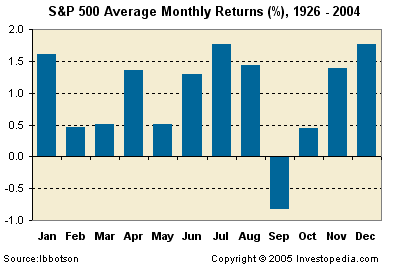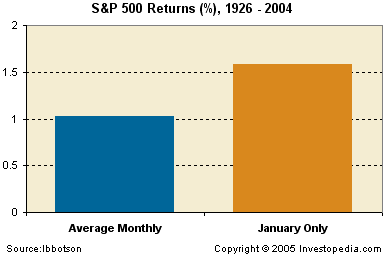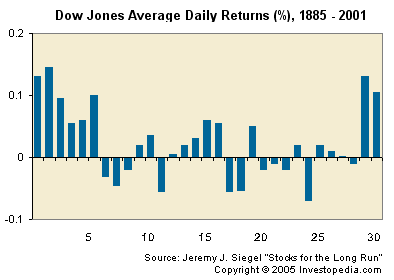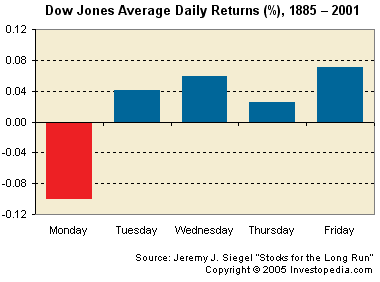Even in efficient markets, where security prices accurately reflect
all relevant and recent information, many well-documented seasonal
effects continue to exist in many markets. In this article, we'll take
you through some of these existing seasonal anomalies and show you how
to take advantage of stock market seasonality by timing your buying and
selling decisions according to daily, weekly and monthly trends.
Monthly SeasonalityThe markets tend to have strong returns around the turn of the year as well as during the summer months, while September is traditionally a down month. The average return in October is positive historically, despite the record drops of -19.7% and -21.5% in 1929 and 1987.
How can You benefit?
An investor may consider buying more equities in September. However, please keep in mind that timing the market perfectly is nearly impossible and investors who trade frequently pay more commissions, but do not necessarily make more money. Furthermore, there is a difference between market timing and factoring in seasonality in investment decisions.
Monthly SeasonalityThe markets tend to have strong returns around the turn of the year as well as during the summer months, while September is traditionally a down month. The average return in October is positive historically, despite the record drops of -19.7% and -21.5% in 1929 and 1987.
 |
How can You benefit?
An investor may consider buying more equities in September. However, please keep in mind that timing the market perfectly is nearly impossible and investors who trade frequently pay more commissions, but do not necessarily make more money. Furthermore, there is a difference between market timing and factoring in seasonality in investment decisions.
Market timing is based on short-term price patterns and trying to pick market tops and bottoms.
Seasonality is about anticipating how the market will behave in a given
time of year and taking a position before the change occurs (e.g., if I
know that December and January are usually strong then I may invest in
November to make sure that I hold my investments in the following
months).
End of DecemberIn order to claim capital losses, many investors sell stocks that have declined in value throughout the year during the last trading days of the year.
How can you benefit?If you plan on selling to book a tax loss, you may consider doing it before many investors start to sell stocks en masse at year's end.
January EffectAt the beginning of January, investors return to equity markets with a vengeance, pushing up prices of mostly small cap and value stocks, according to "Stocks for the Long Run: The Definitive Guide to Financial Market Returns and Long-Term Investment Strategies" by Jeremy J. Siegel (2002) and the "Stock Trader's Almanac, 2005" by Yale Hirsch and Jeffery J. Hirsch.
The effect is most pronounced for small cap and value stocks, but it could also be extended to the entire equity market.
How can you benefit?In terms of seasonality, the end of December has shown to be a good time to buy small caps or value stocks.
Turn of the MonthTurn of the month is a term that refers to the tendency of stocks to rise at the turn of a month and fall in the middle of a month. This tendency is mostly related to periodic new money flows directed toward mutual funds at a beginning of every month
How can you benefit?This is a powerful effect that is easy to use. If you have a monthly plan, you should consider making regular contributions in the middle of the month rather than at the beginning.
Window DressingMany mutual fund managers attempt to make their balance sheets look pretty at the end of each quarter by buying stocks that have done well during a particular quarter. For many of these managers, hanging on to their jobs is more important to them than the best interest of their mutual fund's unit holders.
End of DecemberIn order to claim capital losses, many investors sell stocks that have declined in value throughout the year during the last trading days of the year.
How can you benefit?If you plan on selling to book a tax loss, you may consider doing it before many investors start to sell stocks en masse at year's end.
January EffectAt the beginning of January, investors return to equity markets with a vengeance, pushing up prices of mostly small cap and value stocks, according to "Stocks for the Long Run: The Definitive Guide to Financial Market Returns and Long-Term Investment Strategies" by Jeremy J. Siegel (2002) and the "Stock Trader's Almanac, 2005" by Yale Hirsch and Jeffery J. Hirsch.
 |
The effect is most pronounced for small cap and value stocks, but it could also be extended to the entire equity market.
How can you benefit?In terms of seasonality, the end of December has shown to be a good time to buy small caps or value stocks.
Turn of the MonthTurn of the month is a term that refers to the tendency of stocks to rise at the turn of a month and fall in the middle of a month. This tendency is mostly related to periodic new money flows directed toward mutual funds at a beginning of every month
 |
How can you benefit?This is a powerful effect that is easy to use. If you have a monthly plan, you should consider making regular contributions in the middle of the month rather than at the beginning.
Window DressingMany mutual fund managers attempt to make their balance sheets look pretty at the end of each quarter by buying stocks that have done well during a particular quarter. For many of these managers, hanging on to their jobs is more important to them than the best interest of their mutual fund's unit holders.
How can you benefit?For individual investors, the effect may be significant, but the transaction costs may outweigh the benefits. It's generally not a good idea to buy stocks just to make your portfolio look nice.
Pre-Holiday RallyDue to general optimism, stock markets tend to rise ahead of three-day holidays in the United States such as Independence Day, Thanksgiving, etc.
How can you benefit?Again, this is a situation in which transaction costs may outweigh the benefits.
Monday EffectFor decades, the stock market has had a tendency to drop on Mondays, on average. Some studies, as in "A Survey of the Monday Effect Literature" by Glenn N. Pettengill in the Quarterly Journal of Business and Economics (summer 2003), have attributed this to a large amount of bad news being released over the weekend. Others point to investors' gloomy mood, which is especially evident during the early hours of Monday trading.
How can you benefit?If you're planning on buying stocks, you're better off doing it on a Monday than any other day of the week. If you're an experienced trader, and are interested in short selling, then Friday is the best day to take a short position (because stocks tend to be priced higher on a Friday), and Monday is the best day to cover your short.
Lower Your TaxesInvestors should be very careful when buying mutual funds in December before the annual distribution. In the New Year, they may be quite surprised to find that although their funds have declined in value, they are still required to pay taxes on the annual distribution.
Let's use a TD Bank U.S. Equity Fund as an example. Suppose that an investor buys a fund on December 22, 2004, at $18.1 per unit. On December 24, the fund distributes capital gains of $0.2768 and income distribution of $0.0126 on which the holder will have to pay tax, while the value of the fund declines to $17.96 (including the distribution). In effect, the new buyer ends up paying taxes for all the other people who held the fund throughout the year but sold it before distribution. This may not seem fair, but this loophole in the current system can really eat into your returns if you're not careful.
Pre-Holiday RallyDue to general optimism, stock markets tend to rise ahead of three-day holidays in the United States such as Independence Day, Thanksgiving, etc.
How can you benefit?Again, this is a situation in which transaction costs may outweigh the benefits.
Monday EffectFor decades, the stock market has had a tendency to drop on Mondays, on average. Some studies, as in "A Survey of the Monday Effect Literature" by Glenn N. Pettengill in the Quarterly Journal of Business and Economics (summer 2003), have attributed this to a large amount of bad news being released over the weekend. Others point to investors' gloomy mood, which is especially evident during the early hours of Monday trading.
 |
How can you benefit?If you're planning on buying stocks, you're better off doing it on a Monday than any other day of the week. If you're an experienced trader, and are interested in short selling, then Friday is the best day to take a short position (because stocks tend to be priced higher on a Friday), and Monday is the best day to cover your short.
Lower Your TaxesInvestors should be very careful when buying mutual funds in December before the annual distribution. In the New Year, they may be quite surprised to find that although their funds have declined in value, they are still required to pay taxes on the annual distribution.
Let's use a TD Bank U.S. Equity Fund as an example. Suppose that an investor buys a fund on December 22, 2004, at $18.1 per unit. On December 24, the fund distributes capital gains of $0.2768 and income distribution of $0.0126 on which the holder will have to pay tax, while the value of the fund declines to $17.96 (including the distribution). In effect, the new buyer ends up paying taxes for all the other people who held the fund throughout the year but sold it before distribution. This may not seem fair, but this loophole in the current system can really eat into your returns if you're not careful.
As always, it is advantageous to minimize taxes. Avoiding the
purchase of mutual funds before the December distribution will ensure
that you do not get taxed for gains made by the fund throughout the
year. Therefore, anytime after January 1 is a good time to buy mutual
funds.
ConclusionWith time, some of the current calendar anomalies will likely disappear and be replaced by others. Several of the existing anomalies are relatively easy to take advantage of, such as making regular purchases of mutual funds in the middle of the month instead of at the start of a month. It is in your best interest to be informed about the seasonal effects in capital markets so that you can begin to use them to your advantage.
ConclusionWith time, some of the current calendar anomalies will likely disappear and be replaced by others. Several of the existing anomalies are relatively easy to take advantage of, such as making regular purchases of mutual funds in the middle of the month instead of at the start of a month. It is in your best interest to be informed about the seasonal effects in capital markets so that you can begin to use them to your advantage.
http://www.investopedia.com/articles/05/seasonaltrends.asp




No comments:
Post a Comment